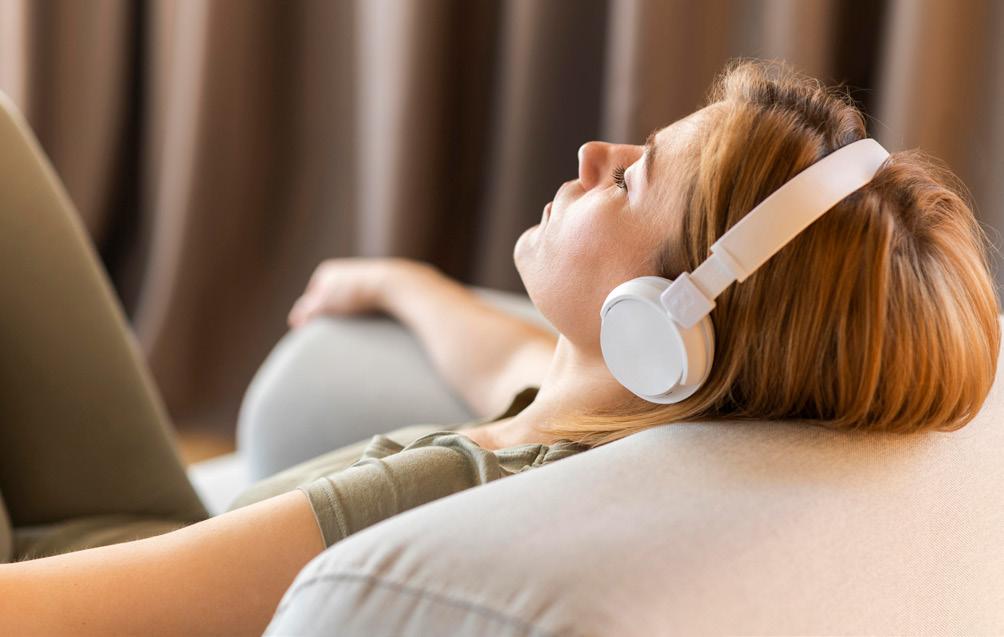
8 minute read
Science Today
The impact of music on dementias
Dementia, defined as an impairment of cognitive functions that interferes with autonomy or independence in daily activities, is one of the most common causes of disability and dependence in adults. According to the World Alzheimer’s Report (2022), more than 78 million people worldwide will have dementia by 2030 and the number is expected to reach 139 million by 2050.
Although there are different types of dementias, with heterogeneous clinical manifestations and neuropathological characteristics, all of them cause interruptions in neuronal communication (causing cell death in different brain areas) due to the abnormal accumulation of proteins [1], both intra- and extracellular.
It’s estimated that between 60%-80% of all cases of dementia, the one diagnosed as Alzheimer’s disease (AD) is the most common in adults, causing a progressive deterioration of memory and a loss of functional autonomy.

In young people [2], the most frequent causes of dementia onset, and with a relatively high prevalence, are those produced by frontotemporal area degeneration (FTLD), and different variants may occur:
Behavioral (bvFTD), with abrupt changes in behavior and personality.
Linguistic (primary progressive aphasia PPA with progressive loss of semantic knowledge svPPA, and the non-fluent variant, nfvPPA, similar to Broca’s).
Despite research efforts, there are still no medical solutions to cure dementia, but there are treatments that can reduce the progression of symptoms, albeit with time limits. One of them is through music therapy.
Let us remember, however, that properly used music, even taking into account its limitations, can also be an effective tool for the prevention of dementia, contributing to increase cognitive reserve and delaying the onset of symptoms due to the cognitive resources it demands and the neuroplastic activation it involves. Several lines of evidence suggest that lifelong musical activities, such as playing a musical instrument or dancing, are associated with a reduced risk of developing dementia [3].
The following are the findings of various studies regarding different affectations in people with Alzheimer’s dementia (AD).
Impairment of musical perception
There are contradictory results in relation to the affectation of the different brain circuits or areas involved in musical perception [4]. Thus, in pitch and timbre discrimination tasks, some studies conclude that there are no differences with healthy controls [5], and others that Alzheimer’s patients have a lower performance. In short, it is observed that deficiencies in music perception vary according to the different clinical syndromes and could depend, at least partially, on the impairment of other cognitive functions, such as working memory or executive functions.
Memory impairment
One of the cognitive functions essential for maintaining memory is attention, which is often easily impaired after a brain injury.
We know that different types of memory can be differentiated based on the use of distinct neural networks. Thus, procedural or implicit memory (recall of skills, such as riding a bicycle or playing a musical instrument [6]) or episodic or explicit memory (recall of personal experiences) do not share exactly the same brain areas. Implicit recall mainly involves the basal ganglia, the cerebellum, the premotor area and the anterior cingulate. In the explicit, the hippocampus, the prefrontal area and the temporal lobe.
In fact, although AD is, by definition, a progressive memory impairment, impairment differs according to the type of memory. Episodic or explicit memory is the first to be affected, but procedural or implicit memory remains relatively preserved even in the most advanced stages of the disease. Similarly, musical memory usually remains intact and therefore, the person affected by AD can sing and remember a song learned during childhood, but has forgotten the names of family members.
Autobiographical evocation
Music has also been appreciated for its ability to evoke autobiographical memories in people with dementia. Thus, it has been shown that patients with AD retrieve as many autobiographical memories as healthy people in response to music [7], even more than memories retrieved after viewing photographs.
By accessing, through music (knowing their musical history directly or through their friends or relatives), to certain important moments of their lives, gratifying experiences that improve their quality of life are achieved. The purpose pursued in these cases, through music therapy, is the activation of memories and associations, the improvement of the mood and facilitate the person to interact with the environment.
Such autobiographical memories evoked by music are not found in patients with bvFTD, possibly due to degeneration of medial frontal regions that are involved in autobiographical memory.
Affect on musical learning
It has been shown that dementia does not entirely prevent affected individuals from learning music, even in the presence of severe episodic memory impairment. Cowles et al. (2003) described a violinist with AD who could learn new musical works despite her extremely pervasive deficit in anterograde memory [6]. Similar results were also found in a 91-year-old non-musician with severe AD, yet she was able to successfully learn [9] a new piece of music.

The therapeutic effects of music
The therapeutic effects of music, observed in cases of dementia, can be attributed to various reasons. First, some musical functions remain preserved in dementia patients despite their progressive cognitive decline. In fact, the neurodegenerative process generally affects some regions of the brain while others remain relatively intact for longer periods, allowing music therapists to act on and strengthen residual cognitive abilities. Second, other benefits may arise from the nature of music per se, given its ability to affect cognition as well as mood.
As exemplified in a recent model [10], active and passive activities with music engage numerous brain functions and regions simultaneously, which promotes neural plasticity. In addition, the emotional connotation of music plays an important role in the efficacy of music therapy, as certain melodies can elicit positive mood states and provide the key to accessing meaningful autobiographical memories, as cited above. Music has a strong personal meaning (musical history) and helps people regain a sense of self.

The implementation of therapeutic protocols taking into account these potentialities offers encouraging results in cognition, attention and verbal fluency. For example, through 10 weekly sessions of music listening or singing, in patients with early dementia (diagnoses were not specified) stable or improved performance [11] was obtained in global cognition, attention and executive functions compared to standard attention. However, such positive consequences on cognition were not found in more advanced stages of dementia.
In summary, several studies, both individual and group, show that even in the presence of cognitive and music processing deficits, some musical functions can be preserved in advanced stages of the disease. Furthermore, music may be beneficial in managing psychological, cognitive and behavioral symptoms in patients with dementia. Considering that these results need
to be extended and replicated, music therapy can be considered a promising tool to delay the symptoms of cognitive impairment and improve the quality of life of patients in a relatively easy and cost-effective way.
Jordi A. Jauset, PhD
Doctor of Communication, engineer, and musician; Coordinator of the Music and Neuroscience study group of the Catalan Academy of Music; Scientific communicator. www.jordijauset.es

References
[1] Elahi, F. y Miller, B. A (2017). Clinicopathological approach to the diagnosis of dementia. NatRevNeurol13, PP. 457–476, Retrieved from: https://www.nature.com/articles/ nrneurol.2017.96
[2] Drapeau, J., Gosselin, N., Gagnon, L., Peretz, I. and Lorrain, D. (2009), Emotional Recognition from Face, Voice, and Music in Dementia of the Alzheimer Type. Annals of the NewYorkAcademyofSciences, 1169: 342-345. Retrieved from: https://doi.org/10.1111/j.1749-6632.2009.04768.x
[3] Verghese, J., Lipton, R. B., Katz, M. J., Hall, C. B., Derby, C. A., Kuslansky, G., Ambrose, A. F., Sliwinski, M., Buschke, H.,(2003). Leisure Activities and the Risk of Dementia in the Elderly, The New Journal of Medicine. Retrieved from: https://www.nejm.org/doi/full/10.1056/NEJMoa022252
[4] Jauset-Berrocal, J.A. (2013). Cerebro y música, una pareja saludable. El Ejido (Almería): Círculo Rojo.
[5] Johnson, J., Chiung-Chih. Ch., Brambati, S., Migliaccio, R., Gorno-Tempini, M. L., Bruce M. L., Janata, P. (2011). Music Recognition in Frontotemporal Lobar Degeneration and Alzheimer Disease. Cognitive and Behavioral Neurology24(2). PP. 74-84. Retrieved from: https://journals.lww.com/cogbehavneurol/abstract/2011/06000/music_recognition_in_ frontotemporal_lobar.5.aspx
[6] Anne Cowles, William W. Beatty, Sara Jo Nixon, Lanna J. Lutz, Jason Paulk, Kayla Paulk & Elliott D. Ross. (2003). Musical Skill in Dementia: A Violinist Presumed to Have Alzheimer’s Disease Learns to Play a New Song. Neurocase, 9:6, PP. 493-503. Retrieved from: https://www.tandfonline.com/doi/abs/10.1076/neur.9.6.493.29378
[7] Cuddy, L.L., Sikka, R. & Vanstone, A. (2015), Preservation of musical memory and engagement in healthy aging and Alzheimer’s disease. Ann. N.Y. Acad. Sci. PP. 223-231. Retrieved from: https://nyaspubs.onlinelibrary.wiley.com/doi/10.1111/nyas.12617
[8] Baird, A. et al. (2018). ‘Characterization of Music and Photograph Evoked Autobiographical Memories in People with Alzheimer’s Disease’. Journal of Alzheimer’s Disease, vol. 66, no. 2. PP. 693-706. Retrieved from: https://content.iospress.com/articles/journal-of-alzheimers-disease/jad180627
[9] Baird, A., Umbach, H. & Forde W. (2017). A nonmusician with severe Alzheimer’s dementia learns a new song. Neurocase, 23:1. PP. 36-40. Retrieved from: https://www. tandfonline.com/doi/abs/10.1080/13554794.2017.1287278
[10] Brancatisano O, Baird A and Thompson WF. (2019). A ‘Music, Mind and Movement’ Program for People With Dementia: Initial Evidence of Improved Cognition. Front. Psychol. Retrieved from: https://www.frontiersin.org/articles/10.3389/fpsyg.2019.01435/full
[11] Särkämö, T., Tervaniemi, M., Laitinen, S., Numminen, A., Kurki, M., Johnson, J. and Pekka Rantanen, P., (2014). Cognitive, Emotional, and Social Benefits of Regular Musical Activities in Early Dementia: Randomized Controlled Study, The Gerontologist, Volume 54, Issue 4. PP. 634–650. Retrieved from: https://academic.oup.com/gerontologist/ article/54/4/634/650429?login=false










